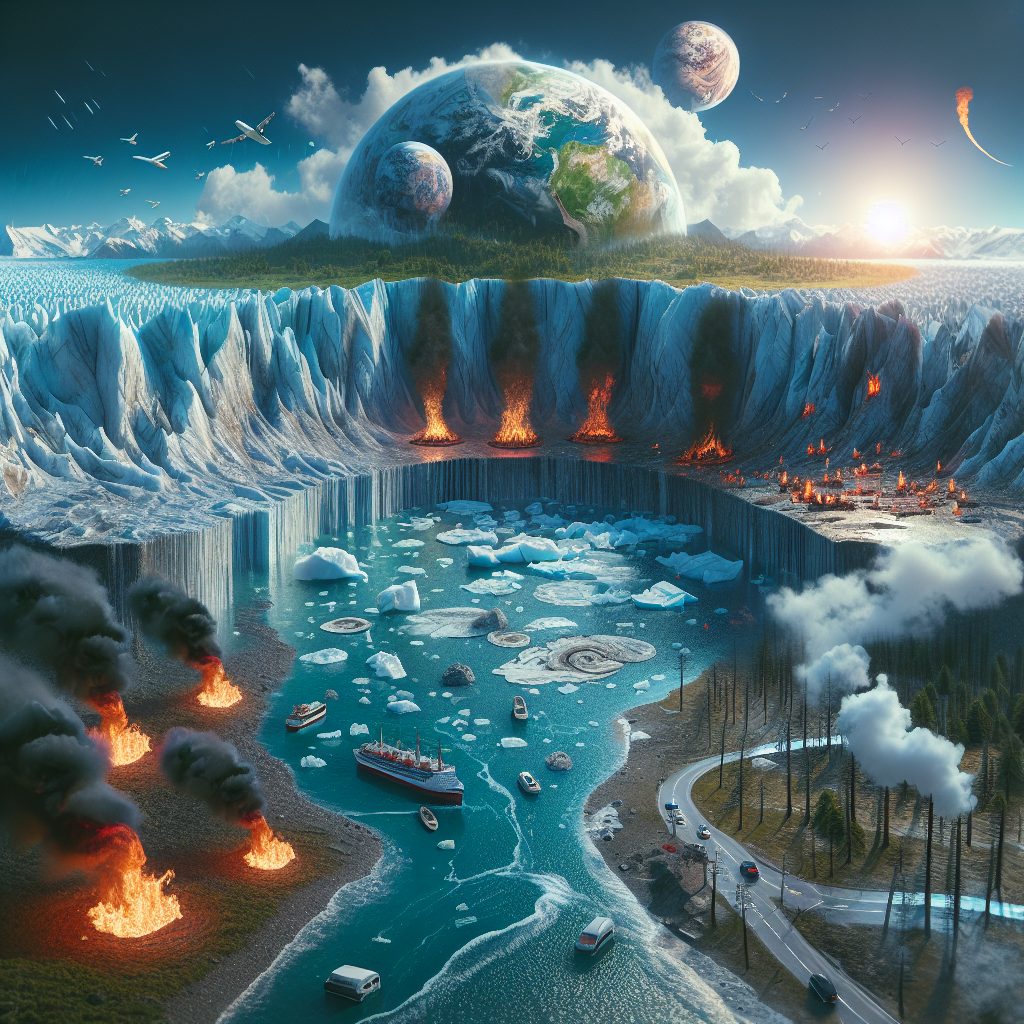
Climate change impacts our planet in various ways, from rising sea levels to extreme weather events. As the Earth’s temperature increases, this leads to an increase in the frequency and intensity of current weather changes. This, in turn, affects our climate patterns in various ways. For example, sea levels have already risen one to two feet since the start of the industrial era, which has led to an increase in the frequency of extreme weather events such as floods and hurricanes. What’s more, changes in climate patterns can also lead to changes in risk levels for spreading of disease, food insecurity, and damaging heat waves that threaten the global water supply.
Despite these frightening statistics, there are a number of potential measures for developing countries, corporations, and governments to take in order to mitigate the effects of climate change. From adopting renewable energy sources to innovating new technologies that absorb greenhouse gases, the list goes on. Through an in-depth discussion of these innovative methods, we can work together to build a stronger and more sustainable future for coming generations.
Key Takeaways
1. Climate change has been associated with extreme weather events, including floods, drought, heat waves and more.
2. Scientific evidence shows that the world is becoming increasingly warmer each year, leading to negative impacts including increasing global temperatures, sea level rise, and loss of biodiversity.
3. The effects of climate change are already present in our everyday lives, from more frequent and intense storms to changes in the global ocean chemistry and sea surface temperatures.
4. The most vulnerable populations, such as small island nations, low-income communities and subsistence farmers are disproportionately impacted by climate change due to their lack of access to resources when disasters strike.
5. To mitigate the worst effects of climate change, nations must commit to drastically reducing the emission of greenhouse gases, taking into account the feedback loop and multiplier effects of climate change.
What are the Impacts of Climate Change?
Environmental Impacts of Climate Change
Climate change has dramatically changed the environment in which we live. The global climate is changing at an unprecedented rate and its effects are becoming more and more noticeable. As a result, the Earth’s climate is changing more rapidly than ever before in human history. This has the potential to cause considerable disruption to human lives, habitats, and food production. The temperature of the Earth’s surface is rising due to increased levels of carbon dioxide in the atmosphere, trapping heat and resulting in climate change. Rising temperatures cause sea levels to rise, glaciers to melt, and changes in the seasonal cycles of weather.
Effects of Climate Change on Human Health
Climate change not only affects the environment, but it also has profound impacts on human health. According to the World Health Organization, climate change can increase the spread of certain infectious diseases such as malaria, dengue, and encephalitis, which can all be caused by the bite of infected mosquitoes. Additionally, extreme weather changes due to climate change can have serious impacts on mental health, leading to anxiety, depression, and post-traumatic stress disorder. Climate change can also increase air pollution, which leads to respiratory illnesses and other health problems.
Economic Impacts of Climate Change
Climate change has the potential to have severe economic impacts as well. High temperatures can cause a decrease in worker productivity and lead to increased energy bills. Changes to weather patterns due to climate change can cause damage to infrastructure such as bridges, roads, and transport systems, resulting in expensive repairs. In addition, extreme weather events such as floods and storms can decrease agricultural productivity and lead to food shortages. This can have a severe impact on the global economy and can exacerbate current economic inequalities.
Addressing Climate Change
Given the serious impacts of climate change, it is essential that we take action to reduce greenhouse gas emissions and limit the rate of climate change. Governments should implement strategies to reduce greenhouse gases and promote renewable energy sources. Individuals can take steps to reduce their own carbon footprints by driving less, using public transport, recycling, and avoiding single-use plastics. Moreover, people can use their voices to advocate for change and encourage governments to take greater action on tackling climate change.
5 Tips for Taking Action on Climate Change
1. Reduce your energy use – switch to energy-efficient appliances and use natural light to reduce your electricity consumption.
2. Reduce your reliance on air travel – consider taking public transport or ride-sharing services instead.
3. Reduce your food waste – buy local produce and only buy what you need to avoid food waste.
4. Recycle properly – follow the local recycling guidelines and separate materials into the correct bins.
5. Support green initiatives – sign petitions, join environmental organisations, and participate in community activities to help raise awareness of climate change.
What are the main causes of climate change?
Climate change is primarily caused by increases in atmospheric carbon dioxide due to the burning of fossil fuels (coal, oil and gas), changes in land use (mainly deforestation) and agricultural practices (livestock production, use of fertilizers and other agrochemicals). Other minor sources of greenhouse gas emissions are industrial processes, such as cement production, and transportation.
What are the impacts of climate change?
Climate change affects the Earth’s climate in numerous ways, including warming global temperatures, rising sea levels, ocean acidification and more. These changes have long-term effects on many of the Earth’s ecosystems, and can cause extreme and unpredictable weather events, such as floods, heat waves and droughts.
What can I do to reduce the impacts of climate change?
Making small changes to our daily lives can make a big difference when it comes to reducing the impacts of climate change. These include reducing energy use (e.g. switching to energy-efficient appliances), reducing waste, avoiding single-use plastic, eating more sustainable, local food and supporting renewable energy sources.
What is the Paris Agreement?
The Paris Agreement is a legally binding international agreement that commits countries to reducing greenhouse gas emissions and keeping global temperature increases to well below 2°C (3.6°F) above pre-industrial levels. The agreement was adopted at the 21st Conference of the Parties to the United Nations Framework Convention on Climate Change (UNFCCC) in Paris in 2015.
How are countries responding to climate change?
Countries around the world are beginning to take action on climate change. These include introducing legislation to limit greenhouse gas emissions, investing in renewable energy sources, providing subsidies for renewable energy and energy efficiency measures, and creating carbon pricing systems.
What is the difference between climate change and global warming?
Climate change is a broad term that covers the long-term changes in Earth’s average climate, whereas global warming is an increase in Earth’s average surface temperature, as a result of an increase in certain greenhouse gases. Global warming is one of the effects of climate change.
What is the difference between weather and climate?
Weather is the day-to-day changes in conditions such as temperature, precipitation, and wind, whereas climate can be defined as the average and typical conditions that exist in a particular area over a long period of time. Climate change is a long-term change in the average climate of an area, worldwide or where measured locally.
What effect do greenhouse gases have on climate change?
Greenhouse gases trap heat in the atmosphere, causing the Earth’s average temperature to rise. This effect is known as the ‘greenhouse effect’, and is one of the primary causes of climate change. The most important greenhouse gases are carbon dioxide, methane, nitrous oxide and water vapor.
What is ocean acidification?
Ocean acidification is the process by which the ocean’s pH level decreases due to increasing levels of carbon dioxide in the atmosphere. This reduces the level of carbonate ions in the water, which affects the ability of marine organisms to build shells and skeletons.
What is the Kyoto Protocol?
The Kyoto Protocol is an international agreement on climate change, which was adopted in 1997 and went into effect in 2005. The Protocol requires countries to reduce their emissions of greenhouse gases below the levels agreed. It also established international carbon trading, joint implementation, and clean development mechanism projects.
Final Thoughts
Climate change is an urgent and serious global problem that needs to be dealt with now. It affects us all and tackling it requires collective global action, yet there is also much we can do as individuals to reduce our own emissions and support sustainability projects. It is also important to keep in mind that the impacts of climate change are not equally distributed – some regions are more vulnerable to its effects than others, including the world’s poorest people and countries.
In the face of the growing threats posed by climate change, it’s essential to take immediate, decisive action to reduce emissions and increase our resilience. This is why the Paris Agreement and the Kyoto Protocol are such important milestones – they set the foundations for greater cooperation and emphasize the urgent need for us to act now.



